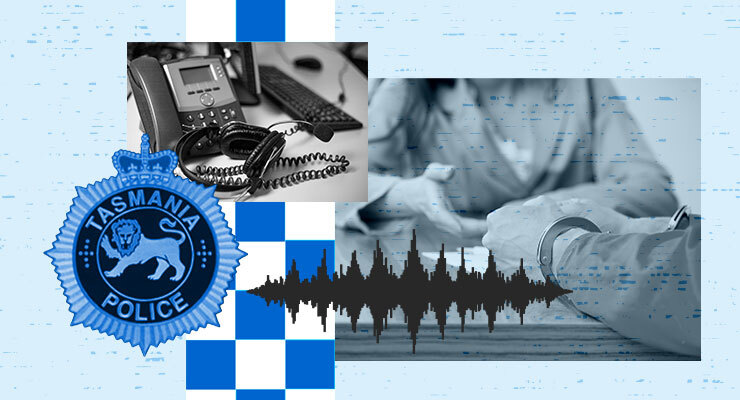
A Supreme Court of Tasmania judgment handed down last week, which found that Tasmania Police illegally recorded confidential discussions between lawyers and clients over 60 days, has drawn intense debate and calls for a wide-ranging commission of inquiry.
The right to have a confidential talk to one’s lawyer about litigation is generally regarded as inviolable. The protection of these communications, known as client legal privilege under Australia’s uniform evidence regime, is fundamental to the administration of justice. If you can’t have a frank, confidential discussion with your lawyer because someone may be listening, you may not seek advice or may not disclose all critical facts, particularly in criminal cases.
When it is undermined, it jeopardises the tenuous balance of legal protections that exist to keep innocent people from rotting in prison cells.
The court found police had failed to tell a magistrate when seeking a warrant to eavesdrop on a meeting between a lawyer and a witness that they would leave the bug on, thus recording every privileged lawyer-client conversation in a prison meeting room over 60 days.
On Wednesday there were calls from myself and others for a commission of inquiry to examine Tasmania Police practices in relation to seeking and executing warrants for the use of listening devices.
Even more extraordinary was the response from Tasmania Police on the same day, which minimised the conduct of its officers as nothing more than a “technical breach”, and announced an independent review by former solicitor-general Michael O’Farrell SC. A review whose terms of reference have never been released, instituted by the organisation whose conduct is impugned, is simply insufficient.
Worse still, on Friday the state’s integrity commission declined to investigate the matter, saying it does not “duplicate work that is being undertaken appropriately by a public authority”.
First, it is hard to accept both Tasmania Police’s claim that the review is independent of it, and that it is being “undertaken by a public authority”. Second, the integrity commission gave no basis for saying the work was being undertaken “appropriately”, and no indication that it was privy to the terms of reference.
Magistrates and justices of the peace who issue warrants generally do not follow up with the police to see how the warrant was executed, or whether the information provided to obtain the warrant turned out to be accurate, and criminal courts are unable to look behind the reason why the warrant was sought.
An independent commission of inquiry is needed precisely because the use of these powers of surveillance is shrouded in secrecy, and because the people who wield them are prepared to diminish egregious overreach as mere “technical breach”.
A commission of inquiry would permit truly a independent examination of police practices and the sufficiency of Tasmania’s very limited oversight regime. It would serve to restore shaken public confidence in police practices and the administration of justice, and not just in relation to the wider case of Susan Neill-Fraser, whose lawyer Jeffrey Ian Thompson was targeted by the initial bugging.
If Tasmania Police’s claim in its disingenuous press release — that it welcomes the opportunity to “ensure transparency and accountability” — is to be believed, the only option is a formally constituted commission of inquiry.
Ultimately, civil liberties are tenuous, and the freedom of a people hangs by the thread of technicalities that police are sworn to uphold.








Yes, there should be an independent commission of inquiry. This is urgent and important. Things have already gone very wrong. It is bad enough that anyone involved in law enforcement even thought it might be all right to secretly record privileged discussions between a lawyer and client. It is far worse to find this was proposal was approved and carried out. No way is this merely a ‘technical’ breach, and it only aggravates the obvious wrong here that the police would pretend it is. It strikes at the heart of a fundamental right of everyone under the rule of law. The rule of law is being undermined. There not only needs to be an inquiry but it must result in actions designed to prevent any such thing happening in future. Bugging such conversations should be unthinkable.
“must result in actions designed to prevent any such thing happening in future” – is that code for, fire and send to jail all those involved?
No. It means what it says.
If there are existing laws that have been broken by bugging these conversations then it would be entirely appropriate for those laws to be enforced. But I doubt that anything clearly criminal happened here. It is more likely a disciplinary matter over the way warrants were obtained and used/abused. I hope you’re not suggesting retrospective legislation that would be used to impose criminal penalties on those who carried out acts that were not criminal offences when they were committed. That is, quite rightly, normally regarded as completely wrong in principle (although there are exceptions). But I’d have no problem with anyone in law enforcement who deliberately attempts to make or obtain recordings of lawyer/client privileged conversation being fired, no second chance. It would still be necessary to distinguish that from accidentally getting such information, or when a legitimate investigation to get information unavoidably also picks up privileged information. This is not unusual, for example, a suspect’s computer might be seized to look for incriminating records although the computer also carries correspondence with the suspect’s lawyer. There are well-understood procedures for this.
First “Lawyer X”, now this. The system is breaking down.
Yes, the Lawyer X scandal shows the rot extends beyond the Tasmanian police. And perhaps we could include Morrison’s bizarre accumulation of various ministerial appointments, another obvious breach of important conventions that underpin the constitutional framework, as another instance of a complete failure by those involved who should have been preventing the abuse, not facilitating it. No doubt there is more. Those we need to defend and uphold these safeguards are doing the opposite.
1984.